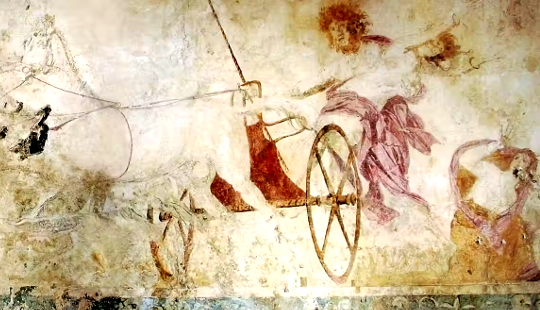
Mural com Hades raptando Perséfone em uma carruagem. De Le Musée absolu, Phaidon, via Wikimedia Commons
Depois de algumas vitórias duramente disputadas, os direitos das mulheres estão novamente ameaçados em muitas partes do mundo. Nos Estados Unidos, a Suprema Corte derrubou o direito das mulheres ao aborto em junho de 2022; as mulheres também foram deixando a força de trabalho desde a pandemia de COVID-19, em muitos casos para cuidar de crianças e parentes idosos. Em outras partes do mundo, especialmente nos países em desenvolvimento, As mulheres são desproporcionalmente afetadas pelas mudanças climáticas.
Como um estudioso da mitologia antiga, Conheço muitas personagens femininas da mitologia grega que nos oferecem modelos para os desafios de hoje. Isso pode ser um pouco surpreendente, porque a Grécia antiga estava sob regras patriarcais estritas: As mulheres eram consideradas menores sob a tutela de seus pais ou maridos por toda a vida e não podiam votar. No entanto, as mulheres nesses mitos falaram a verdade ao poder e resistiram ferozmente à injustiça e à opressão.
deusas rebeldes
A rebelião feminina está no centro da história grega sobre a criação do mundo. Gaia, a deusa da Terra, se rebela contra seu marido Urano, o Céu, que a sufoca e se recusa a deixar seus filhos livres. Ela ordena que seu filho Cronos castre seu pai e assuma seu trono. Uma vez que Cronos chega ao poder, no entanto, ele fica com medo de ser destronado por seus filhos, então ele engole todos os bebês que sua esposa Rhea dá à luz.
Rhea se rebela contra esse ato horrível. Ela dá Cronos uma pedra enrolada em um cobertor para induzi-lo a pensar que ele vai devorar este bebê também. Reia então esconde seu filho, o deus Zeus, que cresce e joga seu pai nas profundezas do submundo. Mas a história se repete, e o novo líder dos deuses novamente teme que sua esposa possa conspirar para derrubá-lo. Como o rei dos deuses, Zeus sempre tem medo de sua esposa Hera, que exige vingança por todas as suas transgressões, especialmente seus inúmeros assuntos.
Da mesma forma, a história de Deméter e sua filha Perséfone mostra uma deusa poderosa se mantendo firme diante das divindades masculinas. Quando Perséfone é raptada por Hades, o rei do submundo, Deméter, a deusa da agricultura, se recusa a deixar as colheitas crescerem até que Perséfone seja devolvida. Apesar das súplicas de Zeus, Deméter não cede. O mundo inteiro é estéril de frutas e os humanos passam fome.
Eventualmente Zeus é forçado a negociar, e Perséfone sobe do submundo ficar com a mãe uma parte de cada ano. Durante os meses em que Perséfone está com Hades, Deméter retém a vegetação e é inverno na Terra.
mulheres mortais
A cultura grega, no entanto, desconfiava de mulheres obstinadas e as retratava como vilãs.
erudito clássico Mary Barba explica que as mulheres são caracterizadas dessa forma por escritores homens para justificar a exclusão das mulheres do poder. Ela argumenta que a definição ocidental de poder se aplica intrinsecamente aos homens. Portanto, barba explica, “[As mulheres] são, na maioria das vezes, retratadas como agressoras, e não como usuárias do poder. Eles o tomam de forma ilegítima, de uma forma que leva à fratura do Estado, à morte e à destruição. … Na verdade, é a confusão inquestionável que as mulheres fazem do poder que justifica sua exclusão dele na vida real.”
Beard usa as histórias de Clitemnestra e Medea, entre outras, para ilustrar seu argumento. Clitemnestra pune seu marido, Agamenon, por sacrificando sua filha Ifigênia no início da Guerra de Tróia. Ela toma o poder em seu reino de Micenas enquanto Agamenon ainda está em guerra, e quando ele retorna, ela o mata a sangue frio.
Medea faz seu marido, Jason, pagar o preço final por abandoná-la – ela mata seus filhos.
Medea, como uma princesa estrangeira na cidade grega de Corinto, uma feiticeira poderosa e uma pessoa negra, é marginalizada de várias maneiras. No entanto, ela se recusa a recuar. Estudiosa clássica e intelectual feminista negra Shelley Haley enfatiza que Medeia é orgulhosa, uma característica que é vista como tipicamente masculina na cultura grega.
Haley vê as ações de Medeia como uma forma de afirmar sua individualidade diante das expectativas da sociedade grega. Medea não está disposta a dar a Jason a liberdade de iniciar um relacionamento com outra mulher e ela negocia asilo em seus próprios termos com o rei de Atenas. De acordo com Haley, Medeia “resiste às normas culturais que inscrevem a maternidade como a única razão de ser da existência feminina. Medea ama seus filhos, mas como um homem, seu orgulho vem em primeiro lugar.”
Comédia e tragédia
De forma mais humorística, em “Lysístrata”, o dramaturgo Aristófanes imagina as mulheres de Atenas protestando contra a destruição Guerra do Peloponeso fazendo uma greve de sexo. Sob tamanha pressão, seus maridos cedem rapidamente e a paz é negociada com Esparta.
Lysístrata, a líder das mulheres grevistas, explica que mulheres sofrem duplamente na guerra, embora não tenham voz na decisão de entrar na guerra. Elas sofrem primeiro por terem filhos e depois por vê-los enviados como soldados. Eles podem ficar viúvos e escravizados, bem como em consequência da guerra.
Finalmente, em uma famosa tragédia de Sófocles, Antígona luta pela decência humana diante da autocracia. Quando os irmãos de Antígona, Etéocles e Polinices, lutam pelo trono de Tebas e acabam se matando, o novo rei, Creonte, ordena que apenas Etéocles, que ele considera ter sido o rei legítimo, seja enterrado com honra. Antígona se revolta e diz que deve defender a lei divina em vez da lei humana tirânica de Creonte. Ela borrifa o corpo de Polinices com um pouco de pó, um gesto simbólico que permite ao morto seguir para a vida após a morte.
Antígona entra em ação sabendo muito bem que Creonte a matará para cumprir seu decreto. No entanto, ela está preparada para oferecer o sacrifício final por suas crenças.
Mulheres e justiça moral
Ao longo dessas histórias, as figuras femininas representam a justiça moral e personificam a resistência de pessoas sem poder. Talvez por isso a figura da Medusa, tradicionalmente vista como um terrível monstro feminino derrotado pelo herói masculino Perseu, foi recentemente reinterpretado como um símbolo de força e resiliência.
Reconhecendo que o a Medusa mitológica foi transformada em um monstro como resultado de seu estupro por Poseidon, muitos sobreviventes de agressão sexual adotaram a imagem da Medusa como uma imagem de resiliência.
Escultor Luciano Garbati virou o mito de cabeça para baixo. Em uma nova visão da imagem tradicional do vitorioso Perseu com a cabeça da Medusa, Garbati deu à Medusa uma nova postura poderosa com sua estátua "Medusa com a cabeça de Perseu". O comportamento pensativo e determinado de Medusa tornou-se um símbolo do movimento #MeToo quando a estátua foi montada fora do tribunal onde Harvey Weinstein e muitos outros acusados de agressão sexual foram julgados.
O que isso significa no mundo de hoje?
Ecos de todas essas histórias ressoam fortemente hoje nas palavras de jovens ativistas destemidas.
Malala Yousafzai defendeu a educação de meninas no Afeganistão controlado pelo Talibã, embora soubesse que as possíveis repercussões poderiam ser terríveis. Em entrevista para um podcast, ela disse: “Sabíamos que nada mudaria se ficássemos quietos. A mudança vem quando alguém está disposto a se levantar e falar.”
Greta Thunberg, abordando líderes mundiais na Cúpula de Ação Climática das Nações Unidas em 2019, não perdeu o ritmo: “Você está falhando conosco. Mas os jovens estão começando a entender sua traição. Os olhos de todas as gerações futuras estão sobre você. E se você escolher falhar conosco, eu digo: Nós nunca iremos te perdoar. Não vamos deixar você escapar dessa. Aqui e agora é onde traçamos a linha.”
Para as mulheres que continuam a lutar contra a opressão, pode ser um conforto e um catalisador para a ação saber que elas têm feito isso por milênios.![]()
Sobre o autor
Marie Claire Beaulieu, Professor Associado de Estudos Clássicos, Tufts University
Este artigo foi republicado a partir de A Conversação sob uma licença Creative Commons. Leia o artigo original.

Livros relacionados:
Casta: as origens de nossos descontentamentos
por Isabel Wilkerson
Neste livro, o autor examina a história da opressão racial na América e explora como ela continua a moldar as estruturas sociais e políticas de hoje.
Clique para mais informações ou para encomendar
Não consolidado: Minha história de libertação e o nascimento do movimento Eu também
por Tarana Burke
Tarana Burke, fundadora do movimento Me Too, compartilha sua história pessoal e discute o impacto do movimento na sociedade e a luta pela igualdade de gênero.
Clique para mais informações ou para encomendar
Sentimentos Menores: Um Acerto de Contas Asiático-Americano
por Cathy Park Hong
A autora reflete sobre suas experiências como asiática-americana e explora as complexidades da identidade racial, opressão e resistência na América contemporânea.
Clique para mais informações ou para encomendar
O propósito do poder: como nos unimos quando nos separamos
por Alicia Garza
A cofundadora do movimento Black Lives Matter reflete sobre suas experiências como ativista e discute a importância da organização comunitária e da construção de coalizões na luta por justiça social.
Clique para mais informações ou para encomendar
Como ser um anti-racista
de Ibram X. Kendi
O autor oferece um guia para indivíduos e instituições reconhecerem e desafiarem crenças e práticas racistas e trabalharem ativamente para criar uma sociedade mais justa e equitativa.






















